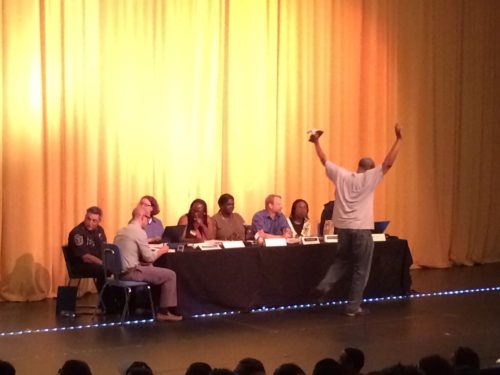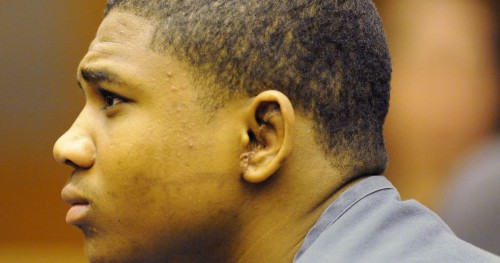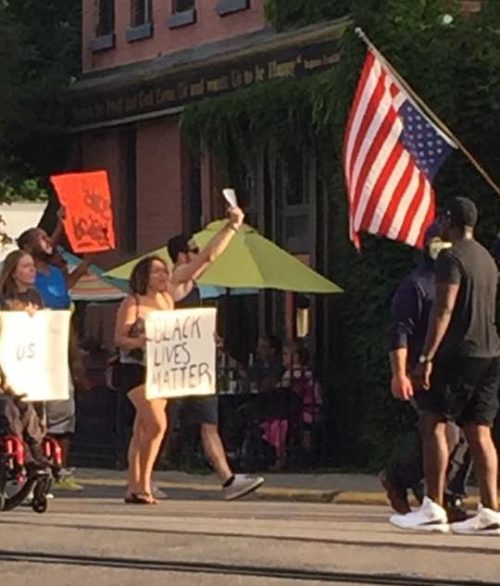Following are my extremely rough, admittedly incomplete notes on tonight’s meeting of the Ypsilanti Police-Community Relations / Black Lives Matter Joint Task Force. If you were also in the audience, and have something to add, please leave a comment. And, of course, feel free to weigh in on whatever you read below. As you’ll soon see, there’s quite here that’s worthy of further discussion.

THE INTRODUCTION.
It was a full house. Almost every seat in the Ypsi High auditorium was taken. The parking lot was full. People in the audience clapped loudly when it was mentioned from the stage that this was the most well attended meeting of the task force to date.
City Council’s Nicole Brown started things off by offering her perspective on the “systematic oppression” faced by black members of our society, who, she reminded us, were more likely to be pulled over, shot, and imprisoned. She then explained that, since the task force was called together in September, 2015, they’d been focused on three things; streamlining the citizen complaint process, assessing the diversity, implicit bias and mental health training made available to officers in the Ypsilanti Police Department, and researching other cities where Citizen Review Boards had been put in place to oversee police activities. Brown tells us that, thanks to their work, it’s now easier to file an official complaint with the police department, both online, and through a number of designated locations around town, where people don’t have to encounter police officers. She then called on Police Chief Tony DeGiusti to tell us about officer training, body cameras and the Eastern Washtenaw Safety Alliance.
Chief DeGuisti, after thanking people for showing up and engaging in the conversation, introduced people to the concept of the Eastern Washtenaw Safety Alliance, which was established in 2013, after the murder of an EMU student, in order to better coordinate the activities of our several local law enforcement agencies. [Essentially the agreement erased boundaries, so that officers could move somewhat freely through the area.] As for body cameras, DeGuisti said that they aren’t the panacea that we’d hoped, as they don’t offer a cinematic view of what our officers are seeing, but he says they’re a useful tool. The department, he says, currently has 15, but they’re applying for grants that would make them available to every officer. On the subject of training, DeGuisti says that training itself isn’t enough. He says you need to also have an “organizational culture” that stresses all people be treated with “dignity and respect.” He assures us that the department has “core values” that make the training sound. As for the training, he says it starts at the Police Academy, where recruits go through 594 hours of training across 70 different topic areas. This, he tells us, includes 8 hours of “cultural awareness” training. He said this training continues once officers join the department, where they’e given additional training in legal procedures, firearms, first aid, policy, cultural awareness, various special topics, alzheimers awareness, interviewing techniques, domestic violence awareness, etc. This September, he says, they will start implicit bias training, and training as to how to deal with mentally impaired individuals. All officers will receive 8 hours of training as part of this course, and their CIT (Crisis Intervention Team) officers will receive up to 40 hours of training. “We’re always looking to get better,” he tells us.
City Council Member Anne Brown talks about the research done to date on the establishment of a Citizen Review Board. She tells us that they’ve looked at current practices, local and national Black Lives Matter recommendations, and what’s already been done in communities like Portland, Flint, Rochester, San Francisco, Tucson and Detroit. And they intend to present their best practices for community oversight by the end of this month, she says. She tells us that their report will include a list of items of concern, as well as a 9 point implementation plan.
City Council Member Dan Vogt was then asked to say a few words about the Water Street Debt Reduction Millage, which will go before voters on August 2. He explained that, if we wanted to maintain City srvices, we’d pass it. Otherwise, he said, we may have to further cut our police force. And, he added, this would likely mean fewer female officers and officers of color, as they’re often the first to go when benefits and the likes are cut, given that they’re in high demand, and can easily move to other departments. [During the community feedback segment of the program, a young man tells the members of Council that they were wrong to use this as an opportunity to sell the millage.]
Sheriff Jerry Clayton come to the stage to talk about the bigger picture. He says he’s a student of history, and warns that we’re doomed to repeat the past if we don’t learn from it. “Events continue to set us back,” he says, referencing the events of this past week. But, the tells us, we can move forward. Police officers, he says, can both be effective and treat people with dignity and respect. “We ultimately get out power and authority from you,” he says. He then tells us that his department is conducting an extensive review of their “use of force” procedures. [Internally, he tells us, they call these “subject control” procedures.] And, he says, they’re increasing their training in de-escalation and implicit bias, and dealing with individuals suffering from mental health issues. Not only does his department have the resources to do these things, he tells us, but they’re making this training available to other local forces as well. In conclusion, he says, “We’re not perfect, but we will own up to it, and we will fix it.” “We might be back here next year,” he says, warning everyone that this may well be a long process, “but we need to keep working together.”
PERSONAL STORIES OF INTERACTIONS WITH POLICE.
Throughout the evening, several people walked to the front of the auditorium to share their personal stories of interactions with police officers in the area. These are just a few examples of what was said.
A woman told the story of her 13 year old son, who the police rolled up next to while he was waiting for his school bus. They claimed that a neighbor had called to report a suspicious individual with a backpack. Then, without calling her, the police asked him to get into their car and drove him to school. “How can I feel safe when my son looks suspicious on his own street gets picked up by the police?”, she says. And how is it, she wants to know, that the police can just pick up her son and put him in a squad car without contacting her? In a world where young black men never come home after being picked up by the police, she wants to know how this could happen.
A number of women speak about raising young black men, and the fear they have that one day these young men may find themselves alone with a police officer, who might escalate a situation to the point of tragedy. One woman tells us that she won’t allow her 20 year old brother to drive, for fear that he may be pulled over. She tells us that she drives him everywhere. Another woman tells us that she called her son on the day of the Dallas shootings, and told her son to stay inside, worried that police officers may be looking for retribution. This, they tell us, is the reality of the world they live in.
A 70 year old man tells of something that happened to him 6 years ago, an interaction with police that left him upside down and naked in a ditch for an hour. He told us that he’d served 20 years in the military without a scratch, but this exchange sent him to the VA, suffering from post traumatic stress. He still gets upset today when he thinks about it, he tell us, with a quiver in his voice. And this, he says, is the first time he’s ever told anyone about it. He says he requested the dash cam footage from the police car, only to be told that it didn’t exist. When he finally did receive it, she said, it came in two parts. One was 30 seconds long. The other was less than a minute. He says he’s told his grandsons, if they’re stopped, to put their hands behind their heads and not engage. When you engage, he says, things can escalate, and you can wind up dead.
A young man stood up to say that he’s had a lot of experiences with local police, and none of it has been positive. “I hate to say it,” he said, “but it is what it is.” He went on to tell us how he’d been tricked by the police in his youth. “What time is it?”, he says they’d asked him. And, when he reached into his pocket to pull out his phone, they’d ask what he was reaching for, using it as an excuse to question him. “I don’t trust you at all,” he says to the officers in the audience. “Nothing you have even done has ever helped me. When shots are fired, you aren’t there to protect me. When a fight breaks out, though, you’re there to arrest me.”
Nathan Phillips, who is Native American, stood up to share his experience of having been accosted by white EMU students. He says when he asked the police for help, they didn’t do anything. Later, though, when he himself was accused of stealing a lawnmower by three white kids, the police arrested him and held him for nine hours. Now, he says, they’re asking him to plead guilty to assaulting an officer, something that he says he surely did not do.
A woman talks about an incident involving her nephew, who was accused of stealing something while at a white girl’s party. She said that she went with her nephew to the police department when they heard about the accusation, but were met with both disrespect and hostility. She ends by saying that nothing has changed since the murder of Emmett Till. And, she adds, “Thank God for cell phones.” [This was said more than once over the course of the evening, as many people thanked cell phones and social media for making this conversation possible.]
A former teacher in Willow Run Schools tells of a time a few years ago, during Heritage Fest, when she saw officers pushing young people, about 12 to 15 years of age, out of the event. They pushed 50 to 100 kids away from the festival, she said. They were all black. At the same time, however, she notices that 5 to 10 unattended white kids were still on the festival grounds. None of them were pushed out, she said. “I didn’t know who to call,” she said. “Who do we call when we see these injustices?”
A man named Peter Brown says that, this past June, as he was waiting for AAA to come and get his car out of the mud, a police officer rolled up on him. The officer, he says, conducted a field sobriety test, which he passed. In spite of this, he says the officer waved off the tow truck when it arrived to help him, saying “This is a police matter.” He was then taken into custody. When he asked why, he says, he was not given an answer. He was taken to the basement of the Ypsilanti Police Department, and eventually taken to St. Joe’s, where he was compelled to give blood for a drug test. He asked if he could make a call, and he was told no. He was eventually released, although the police refused to return his ID. He was also told that, if he returned, he would be arrested for trespassing. By this point several hours had passed and his car had been towed. And, when he tried to retrieve it, he couldn’t, as he didn’t have his ID. He says he’s yet to be charged, though. And he now has a bill from St. Joe’s for $100, as well as $1,300 in legal fees. “How do I get my money?”, he asked the people sitting at the table in the front of the room, walking toward them with his hands up.

COMMENTS FOM THE AUDIENCE.
Speaking of the cultural competency of our local officers, a man asks, “Where do our officers live? They should live next-door.” He then goes on to ask of the task force members at the table, “Where is the response?” It would be easy, he says, to set up a coffee meeting with citizens and post the details online. Instead, he says, “It’s like 1960.”
Several people ask why our local officers don’t get involved more in the community; visiting schools, playing ball with kids, attending church functions.
A man who says he used to be a corrections officer asks about de-escalation. There’s nothing wrong, he says, with officers wanting to make it home to their families after a shift, “but people shouldn’t have to die.”
A female fire fighter asked if these incidents of police violence might be tied to the fact that police officers are now often patrolling on their own due to budget cuts. She wonders if such things would happen as often with another set of eyes. She also talked from experience about the intensity of the work, and the need for paid time off and having internal people that officers can talk with. After dealing with things like dead kids and accident scenes, she says, “You can feel internal rage.” Things can trigger you, she says. And “you need time to get your head straight.” And you need a culture in which officers feel as though they can request such services.
There were quite a few comments about the mental health of officers. Someone asked if there are anger management classes available for our officers. Someone, after sharing the story of an unstable relative who became an officer, implored people to stop racist, violent people from getting badges.
A number of people talked about the power of love and community. “The only way to end brutality is through unity and love,” someone says.
More than a few people question our priorities. “We spend more on prisons than on schools in this country,” someone says, adding that young people gravitate toward gangs for a reason. “We have money to keep us in jail,” this person says, “but not out of it.” We need to reconsider our priorities, people argue. We need to spend more on education, affordable youth sports, and any number of other things.
A woman, who was herself a local officer at one time, asks about the human resources people within our police departments. Training is good, she says, “but you can’t train an individual to not be racist.” She goes on to say, “You cannot train an officer to not be sexist.” If you hire police officers who think that way, she says, it will carry over into their job. “How can we hire officers that live their lives with integrity?”, she asks. “How do you find them? Where are they?”
“Sentencing disparities” and “over policing” are discussed. It’s also pointed out how insanely high the incarceration rate is in America.
“Children shouldn’t be scared when a police car pulls up,” someone says.
Someone suggests that we monitor the Facebook accounts of our police officers, as well as giving them frequent mental health checks.
A woman asks about the cultural competency training noted by the Police Chief. She asks, “How transparent are you?” She wants to know who teaches it, what the curriculum consists of, and to what extend officers actually have to participate. “Can they just sit through it?”, she asks.
“We cannot let the media separate us,” someone says. Someone else adds, that us black and white folks share a lot more in common than either of us with the 1% that runs our country.
Someone proposes that we think big, like we did after the Great Depression, when we started the Civilian Conservation Corps, putting people to work and teaching them skills in the process.
A women says that she intends to put her license, registration and a letter stating “I refuse to talk with the police” in her car. If she’s pulled over, she says, she’ll just pass it through the window. “When I pass that through the wondow, I don’t have to talk with them, right?”, she asks Chief DeGuisti. He responds by saying, “You’re not compelled to speak.” She encourages others to do the same. If you don’t talk with them, she says, things are less likely to escalate. Just accept the ticket and fight it later in court, she says.
Anthony Morgan, after saying that he’s met with everyone around the table, says, “Nothing has come of this.” This is just a “group therapy session,” he tells us. While the police are not our enemies, he says, they’re limited. “Their only job is to follow orders and not be critical thinkers,” he adds. “We need to either inspire or coerce them, and we have done neither. They haven’t done anything, but we haven’t forced them to.” If something positive had come of this task force, he tells us, we would have heard about it.
A man, talking of the deadly attack agains police officers in Dallas, warns, “The chickens have come home to roost, and copycats are coming. They’re coming.” This, he implies, is the only way things are going to change.
A man who runs a basketball program for kids asks why the police never come by to help out. “Kids look at what you do, not what you say,” he says. He goes on to say, “I’m not depending on the police. I’m depending on you, and you, and you,” pointing around the audience. “Let’s take care of it ourselves”, he says, suggesting that the community would be better off if they didn’t rely on the police. Later in the evening, a white woman in the audience asks, “What can we do to help you?” Someone in the audience responds, “Stop calling the cops, so that we can live.”
Someone says that white people need to put themselves in uncomfortable situations, standing up to the racists they know, and fighting for what’s right. “You need to give up some of your priviledge and get uncomfortable,” someone says. “We’re uncomfortable every day.”
A woman from a racially mixed family shares her experience. “When I go places with my white family,” she says, “I’m dealt with differently than when I’m with my black family.”
Officers need to get over their fear, someone says. They need to “walk the beat for hundreds of hours,” and they need to know the local kids. They need to know the difference between a bad kid and a good kid that’s just acting up, she says. As for what white people can to do help the cause, she says, “Get to know some black people. And don’t listen the media. Don’t let them divide us.” Another woman adds, “Make some black friends… a lot of them… and not just the ones in the academy, but some that cuss a lot, and shit.”
A young woman from Kalamazoo says, “The system isn’t broken. It’s working like it’s supposed to. The police are the enforcement arm of Capitalism.” On the subject of Capitalism, someone else adds, “Our value isn’t tied to our productivity.” She says people still deserve to live, even if we don’t see productivity. This person also says that segregation is the norm. “Ann Arbor is getting richer,” she says, “while gutting Ypsilanti.”
[I had to leave a little before 10:00 PM, as I wanted to make it home in time to wish my daughter a happy 12th birthday before she went to sleep, so this is as far as I got. If you stayed later, please let us know what happened… Oh, and we live in a really amazing little community. I’m constantly impressed by the people who call this place home. They’re funny, bright, inquisitive and passionate. And they care deeply about equality.]
















